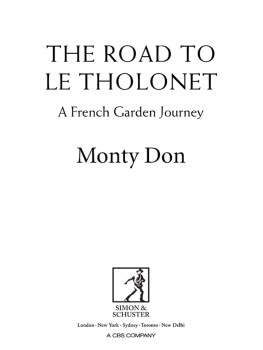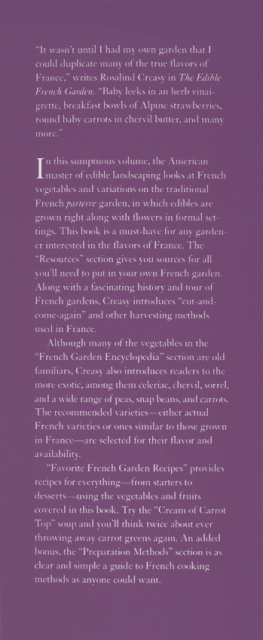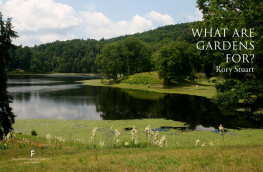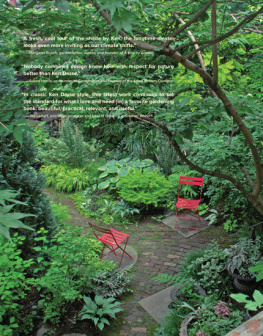THE ROAD TO LE THOLONET

First published in Great Britain by Simon & Schuster UK Ltd, 2013
A CBS COMPANY
Copyright 2013 by Monty Don
This book is copyright under the Berne Convention.
No reproduction without permission.
All rights reserved.
The right of Monty Don to be identified as the author of this work has been asserted by him in accordance with sections 77 and 78 of the Copyright, Designs and Patents Act, 1988.
Simon & Schuster UK Ltd
1st Floor
222 Grays Inn Road
London WC1X 8HB
www.simonandschuster.co.uk
Simon & Schuster Australia, Sydney
Simon & Schuster India, New Delhi
A CIP catalogue record for this book is available from the British Library
Hardback ISBN: 978-1-47111-457-1
Ebook ISBN: 978-1-47111-459-5
The author and publishers have made all reasonable efforts to contact copyright-holders for permission, and apologise for any omissions or errors in the form of credits given. Corrections may be made to future printings.
Typeset in the UK by M Rules
Printed and bound by CPI Group (UK) Ltd, Croydon, CR0 4YY
Dedicated to the memory
of Madame Tailleux, of Le Tholonet
Perhaps my journey to the south will bear fruit however, because the difference of the stronger light, the blue sky, that teaches one to see... The north will certainly appear completely new to me, but Ive looked so much at the things that Ive become strongly attached to them, and Ill remain melancholy for a long time.
Vincent Van Gogh, letter to Theo Van Gogh,
Friday, 6 September 1889. St-Remy de Provence.

INTRODUCTION
This book is not intended to be a comprehensive survey of French gardens. It does not claim to be a selection of the best gardens in France or even a carefully chosen group that highlights French characteristics or idiosyncrasies, horticultural or otherwise. It is much more personal and random than that. It is a ramble, hopping from one garden to another as mood, circumstance and time allowed.
The choice of some of the gardens, particularly in the south, was driven through memory and entirely personal association; some, like Giverny or Versailles, are world famous and visited by hundreds of thousands of people each year; and some, like Vaux le Vicomte or Le Jardin Plume, deserve to be much more widely visited and celebrated than they are. There are gardens that I would have liked to have seen but could not, and others that I did visit, often taking much time and trouble to do so, that were a complete waste of time. So it always goes.
As I say, this book is a very personal peregrination and encompasses gardens that I have visited over the years rather than as one continuous trip, although in the spring and summer of 2012 a year of appalling weather right across France as well as the UK I made six separate journeys to France, so there is a spine of real-time travel running through the narrative.
But I like meandering, both geographically and in time. I like diversions and surprises. As has been observed many times before, one of the best ways to see things is to get lost.
There are a number of good reasons for visiting gardens. Other peoples gardens are often more beautiful and spacious than our own, so we get a straightforward vicarious pleasure from them without any envy to modify it. Many are loaded with historical significance and, because they have to also exist entirely in the horticultural present, bring that history directly alive in a profound and visceral way. If you are a gardener then they are inspirational, stoking ideas and practices to take back to your own back yard. And lovely gardens are surprisingly often made in lovely places, as a kind of response to the landscape, so it is easy to build a trip around them and also include beautiful scenery and food.
But they also work at a more subconscious level. Gardens are the most constant and immediate point of contact with the natural world for almost all societies. (I have visited gardens in the Amazon and Outback where this is not the case, but even in these places gardens instil a sense of ownership and possession that is otherwise impossible in the enormity of jungle, desert or river.) How people shape, tend and think about them can say as much about the society as it does the gardens.
And the French are different from us. I would sometimes say that the English and French have a love/hate relationship, at which point my French companions would smile wryly and say that they, the French, love us it is just we, the English, who hate them. Despite a genuine warmth and admiration for our work ethic, social and cultural freedom and tolerance, they certainly see us as aggressive and often extraordinarily rude. The British have a caricature of the French being high-handed and dismissive, whereas the truth is that they are, by British standards, exceptionally polite and well-mannered. Most people treat each other with a great deal more formal respect in everyday intercourse than anyone in Britain ever does. At the same time tempers will flare much more violently before actual violence is reached. They are a people with a highly developed sense of personal and national honour which should be defended at all times.
I think that the attitude towards the footballer Zindine Zidane illustrates this well. In Britain he is regarded as a sublime talent marred by an act of indiscipline in the World Cup final when he headbutted the Italian defender Marco Materazzi, who had insulted his family, and was sent off. France subsequently lost and, to most British eyes, Zidane had let down himself, his side and his country through a lack of self-control. In France, however, this was seen as an act of magnificent, self-destructive, very human grandeur: being better to go down losing with honour intact than win shamefully. The fact that he was an Algerian and a role model for all immigrant French citizens doubled the respect, because it showed how fully he had integrated with the very French sense of right and wrong.
There are two other aspects of the French character which you see again and again through their gardens. The first is the inherent and learnt respect for, and adherence to, prescribed form. A student learning to prune will master the agreed shapes and styles before dreaming of indulging any free-form expression and is likely never to do so. The essentials of rhythm, balance, geometric symmetry and harmony are still seen as the starting points for any garden design and not just because they make for beautiful gardens but also because they are then in harmony with the essential ingredients of an ordered, harmonious culture and society.
I often think that this expresses itself both most elegantly and irritatingly at the table. The best French meals are a performance that you have to gratefully indulge as a recipient of the wonderful food and drink that is being brought to you. Your role is to be knowing and perceptively appreciative of the depth of skill that is involved. The greater your knowledge in other words the more qualified you are the greater the significance of your respect. There is an underlying solemnity in this that you never experience in other countries, such as Italy.
The second aspect of the French character that you can see beautifully conveyed through their gardens is their love of intellectual debate and concepts. Order and authority has occasionally been challenged by violent revolution as in 1789, 1870 or May 1968, but on the whole the challenges to the received order are intellectual and often passionately and hotly disputed. Versailles, for example, the epitome of order and control, was made with endless metaphorical bosquets and walks with allusion and imagery that had a potency to almost everyone who saw them and extended far beyond their actual physical presence. Modern gardeners such as Gilles Clment receive great respect as much for the ideas behind their gardens as the gardens themselves. Gardens such as Sricourt, Le Jardin Plume, Champ de Bataille or Prieur dOrsan all combine the respect for the formal pattern and dance, exemplified by the work of Andr Le Ntre in the seventeenth century, with a twenty-first sensibility of symbolism, concepts and even philosophising that greatly increase their appeal to their makers and any French visitors.














